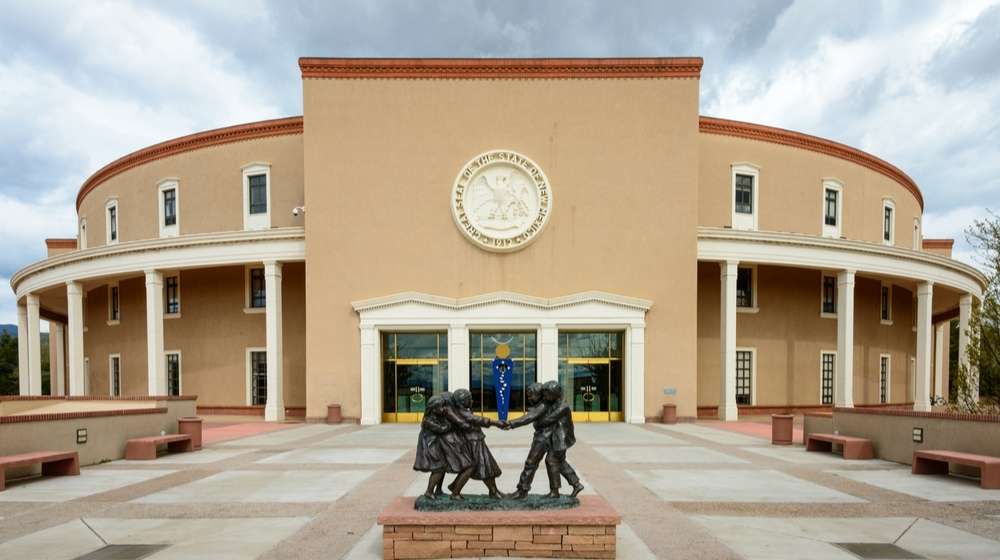Breaking News
New Mexico Senate Bill on Stricter Oil and Gas Wastewater

The New Mexico Senate agreed to take up discussion on a bill that would increase penalties for produced water spills by the oil and gas industry, while also requiring companies to disclose more about what’s in the water and banning the use of freshwater in most cases.
Introduced by State Sen. Antoinette Sedillo Lopez, Senate Bill 86 would serve to amend the Produced Water Act. This act, she said, didn’t go far enough in regulating the use and management of produced water.
It was to be heard and discussed on Thursday before the Senate Conservation Committee.
Produced water forms from a combination of flowback and water brought to the surface along with oil and natural gas from underground shale formations during the hydraulic fracturing, or “fracking,” process.
Environmentalists believe people should consider the water dangerous. However, the State of New Mexico in 2019 began researching ways they could treat and potentially reuse it in other sectors like agriculture.
Produced Water Used in Fracking
Today, many oil and gas operators use recycled produced water for subsequent fracking activities as freshwater sources became increasingly scarce. With this, SB 86 would prohibit freshwater by oil and gas operators in most situations.
It would still allow operators to use freshwater when drilling through our adjacent sources of freshwater to protect them from contamination.
Sedillo Lopez said they intend the bill to help increase transparency in the oil and gas industry. It also aims to incentivize companies to avoid spills while addressing extraction’s impact on the environment.
“The oil companies should have some accountability,” she said. “They should have transparency. They claim trade secret on what they use and put in it. The citizens have a right to know what’s being spilled, and what our land and people are being exposed to,” she then added.
If passed, SB 86 would establish a fine structure for produced water spills and funnel the money received to the Oil Conservation Division to fund its data tracking to make the information more accessible, Sedillo Lopez said.
The Division already maintains a database for spills and releases of multiple categories of oil and gas waste, but she said the fund would expand the State’s data tracking and could improve the agency’s resources and staffing while requiring they report on produced water even when administrations shift.
“They started reporting it just recently. It’s a matter of agency discretion,” Sedillo Lopez said. “I want it in the statute so that standard stays in place.”
Bill to Protect the Scarce Water Supplies of New Mexico
Overall, she said the bill intended to protect New Mexico scarce water supplies, as the state suffered because of drought in the last year – with about 82 percent of the state listed under “extreme drought,” per the latest report from the U.S. Drought Monitor on Jan. 21.
“This is a very parched state. I am very concerned for the drainage of the aquifers,” Sedillo Lopez said. “We don’t really know the impact of the loss of those waters. If we run out of water, people will move away. If we poison the water, people will get sick.”
She was also critical of the Produced Water Act. The said act set out to define how the Oil Conservation Division and parent agency the Energy, Minerals and Natural Resources Department would regulate the use of produced water within the industry.
The law also specified that the New Mexico Environment Department would have to manage any future use of the water outside of extraction.
The act also drew some criticism from environmental groups who said it did not go far enough in creating penalties for operators and appeared to position the industry to release what many considered toxic waste into the environment.
Her amendment, Sedillo Lopez said, could not only hold the industry to account but also improve resources for New Mexico’s regulators.
“I think the State hasn’t been doing enough,” she said. “The agencies don’t have enough resources. (The Produced Water Act) was written by industry. It came out weak, and I’m trying to strengthen it.”
Experts Chime In
In drafting the bill, members of the Sierra Club and other environmentalists consulted Sedillo Lopez.
Norm Guam, a retired water and wastewater engineer who worked on the bill said he felt it largely unnecessary for oil and gas companies to use freshwater. He said the bill intended to recognize that and put a stop to the depletion of New Mexico’s supply.
“Freshwater is in short supply, especially in southeast New Mexico,” he said of the region home to the Permian Basin. There, most of the state’s oil and gas production is centered. “It’s unnecessary to use produced water. Some operators are even saying there is an advantage to using recycled produced water,” he also stated.
Dale Doremus, a hydrogeologist and water issues chair at the Sierra Club also said the bill would provide needed oversight and heightened consequences for spills. This makes releases unaffordable for operators.
“The bill would provide incentives to not spill,” Doremus said. “Hopefully they (operators) will put more resources toward prevention. Outside of oil and gas operations, unauthorized releases are not legal. Why would that not apply to produced water in oil and gas operations?”
Up Next:
- Stocks Will Fall 30% In A Drawn-out Bear Market
- Americans OK To Pay More for Goods Made by Free Nations
- WhatsApp Lost Millions of Users Due to New Terms
Source: Current Argus
